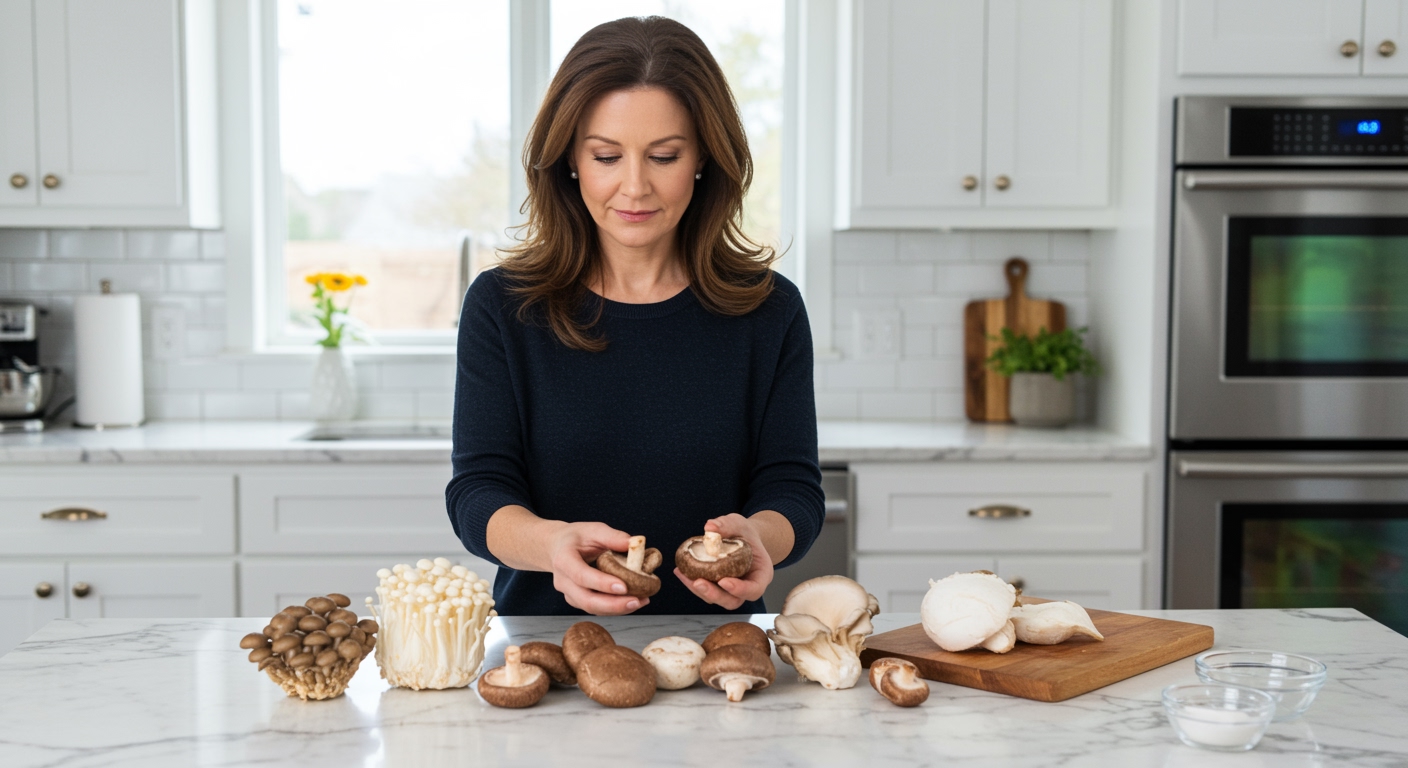✪ Key Takeaway: Mushrooms can help lower blood pressure through potassium, fiber, and antioxidants that support heart health.
Introduction
Your doctor tells you to watch your blood pressure, but you keep reaching for the same boring foods.
You might wonder if there are tasty options that actually help your heart instead of just avoiding the bad stuff.
Hi, I’m Abdur, your nutrition coach and today I’m going to explain how mushrooms can become your secret weapon for managing blood pressure naturally.
What Makes Mushrooms Heart-Healthy?
Mushrooms pack a powerful punch of potassium, which directly counters sodium’s blood pressure-raising effects.
One cup of portobello mushrooms contains about 375 milligrams of potassium, which is roughly 8% of your daily needs.
Your kidneys use this potassium to help flush out excess sodium through urine, creating a natural blood pressure lowering effect.
The fiber content in mushrooms also plays a crucial role by helping your body process cholesterol more efficiently.
When cholesterol levels stay in check, your arteries remain more flexible and less prone to the stiffening that drives up blood pressure.
Mushrooms also contain antioxidants like selenium and ergothioneine that protect your blood vessels from inflammation and oxidative damage.
✪ Fact: Mushrooms are one of the few foods that naturally contain ergothioneine, a powerful antioxidant your body cannot produce.
How Do Different Mushroom Types Compare?
Shiitake mushrooms lead the pack with compounds called beta-glucans that help reduce inflammation in your cardiovascular system.
These beta-glucans work by activating your immune system in a way that reduces the chronic inflammation linked to high blood pressure.
Portobello mushrooms offer the highest potassium content per serving, making them especially effective for sodium balance.
Button mushrooms and cremini mushrooms provide steady amounts of B vitamins that support healthy blood vessel function.
Oyster mushrooms contain lovastatin, a natural compound that helps manage cholesterol levels without medication side effects.
The key is eating a variety of mushrooms regularly rather than relying on just one type for maximum cardiovascular benefits.
✪ Pro Tip: Mix different mushroom types in your meals to get the widest range of heart-protective compounds.
What Does Research Say About Mushrooms and Blood Pressure?
Studies show that people who eat mushrooms regularly have lower systolic blood pressure compared to those who avoid them.
Research published in nutrition journals demonstrates that mushroom consumption correlates with reduced hypertension risk in large population studies.
The DASH diet research specifically includes mushrooms as a recommended food for blood pressure management due to their potassium density.
Clinical trials show that beta-glucans from mushrooms can reduce blood pressure by 3-5 mmHg when consumed consistently over 8-12 weeks.
This reduction might seem small, but it translates to a significant decrease in heart disease and stroke risk over time.
The research consistently shows that mushrooms work best as part of an overall heart-healthy eating pattern rather than as a standalone solution.
✪ Note: Even small blood pressure reductions from foods like mushrooms can significantly lower your long-term cardiovascular risk.
How Should You Add Mushrooms to Your Diet?
Start with one cup of mushrooms three times per week to begin seeing cardiovascular benefits without overwhelming your digestive system.
Sauté mushrooms in olive oil with garlic and herbs instead of butter to maximize their heart-healthy potential.
Add sliced mushrooms to salads, soups, and stir-fries where they absorb flavors while contributing their blood pressure benefits.
Grilled portobello mushrooms make excellent burger replacements that satisfy your taste buds while supporting your cardiovascular goals.
Avoid breading and frying mushrooms, as these cooking methods add sodium and unhealthy fats that counteract their natural benefits.
Fresh mushrooms provide more potassium than canned versions, which often contain added sodium that works against blood pressure control.
✪ Pro Tip: Store fresh mushrooms in paper bags in your refrigerator to maintain their potassium content and prevent spoilage.
Are There Any Concerns With Eating Mushrooms?
Most people can eat mushrooms safely, but those taking blood pressure medications should monitor their levels more closely.
The potassium in mushrooms can enhance the effects of ACE inhibitors and other blood pressure drugs, potentially causing levels to drop too low.
People with kidney disease need to limit potassium intake, so they should consult their doctor before increasing mushroom consumption.
Some individuals experience digestive upset from mushrooms due to their fiber content, especially when eating large amounts suddenly.
Always choose mushrooms from reputable sources and avoid foraging wild varieties unless you have expert knowledge about safe identification.
Start with smaller portions and gradually increase your intake to allow your digestive system to adapt to the increased fiber.
✪ Note: If you take blood pressure medication, track your readings when adding mushrooms to ensure levels stay in your target range.
The Bottom Line
Mushrooms offer genuine blood pressure benefits through their potassium, fiber, and antioxidant content that work together to support cardiovascular health.
The best medicine often grows in the simplest places, and mushrooms prove that powerful nutrition does not require complicated solutions.
I would love to hear about your experience with mushrooms and blood pressure management, so please share your thoughts or questions in the comments below.
References
At NutritionCrown, we use quality and credible sources to ensure our content is accurate and trustworthy. Below are the sources referenced in creating this article:





